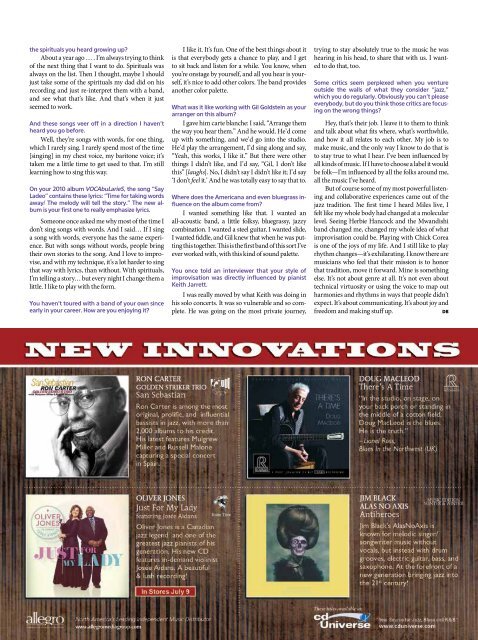You also want an ePaper? Increase the reach of your titles
YUMPU automatically turns print PDFs into web optimized ePapers that Google loves.
the spirituals you heard growing up?<br />
About a year ago … . I’m always trying to think<br />
of the next thing that I want to do. Spirituals was<br />
always on the list. Then I thought, maybe I should<br />
just take some of the spirituals my dad did on his<br />
recording and just re-interpret them with a band,<br />
and see what that’s like. And that’s when it just<br />
seemed to work.<br />
And these songs veer off in a direction I haven’t<br />
heard you go before.<br />
Well, they’re songs with words, for one thing,<br />
which I rarely sing. I rarely spend most of the time<br />
[singing] in my chest voice, my baritone voice; it’s<br />
taken me a little time to get used to that. I’m still<br />
learning how to sing this way.<br />
On your 2010 album VOCAbuLarieS, the song “Say<br />
Ladeo” contains these lyrics: “Time for taking words<br />
away/ The melody will tell the story.” The new album<br />
is your first one to really emphasize lyrics.<br />
Someone once asked me why most of the time I<br />
don’t sing songs with words. And I said… If I sing<br />
a song with words, everyone has the same experience.<br />
But with songs without words, people bring<br />
their own stories to the song. And I love to improvise,<br />
and with my technique, it’s a lot harder to sing<br />
that way with lyrics, than without. With spirituals,<br />
I’m telling a story… but every night I change them a<br />
little. I like to play with the form.<br />
You haven’t toured with a band of your own since<br />
early in your career. How are you enjoying it?<br />
I like it. It’s fun. One of the best things about it<br />
is that everybody gets a chance to play, and I get<br />
to sit back and listen for a while. You know, when<br />
you’re onstage by yourself, and all you hear is yourself,<br />
it’s nice to add other colors. The band provides<br />
another color palette.<br />
What was it like working with Gil Goldstein as your<br />
arranger on this album?<br />
I gave him carte blanche: I said, “Arrange them<br />
the way you hear them.” And he would. He’d come<br />
up with something, and we’d go into the studio.<br />
He’d play the arrangement, I’d sing along and say,<br />
“Yeah, this works, I like it.” But there were other<br />
things I didn’t like, and I’d say, “Gil, I don’t like<br />
this” [laughs]. No, I didn’t say I didn’t like it; I’d say<br />
‘I don’t feel it.’ And he was totally easy to say that to.<br />
Where does the Americana and even bluegrass influence<br />
on the album come from?<br />
I wanted something like that. I wanted an<br />
all-acoustic band, a little folksy, bluegrassy, jazzy<br />
combination. I wanted a steel guitar, I wanted slide,<br />
I wanted fiddle, and Gil knew that when he was putting<br />
this together. This is the first band of this sort I’ve<br />
ever worked with, with this kind of sound palette.<br />
You once told an interviewer that your style of<br />
improvisation was directly influenced by pianist<br />
Keith Jarrett.<br />
I was really moved by what Keith was doing in<br />
his solo concerts. It was so vulnerable and so complete.<br />
He was going on the most private journey,<br />
trying to stay absolutely true to the music he was<br />
hearing in his head, to share that with us. I wanted<br />
to do that, too.<br />
Some critics seem perplexed when you venture<br />
outside the walls of what they consider “jazz,”<br />
which you do regularly. Obviously you can’t please<br />
everybody, but do you think those critics are focusing<br />
on the wrong things?<br />
Hey, that’s their job. I leave it to them to think<br />
and talk about what fits where, what’s worthwhile,<br />
and how it all relates to each other. My job is to<br />
make music, and the only way I know to do that is<br />
to stay true to what I hear. I’ve been influenced by<br />
all kinds of music. If I have to choose a label it would<br />
be folk—I’m influenced by all the folks around me,<br />
all the music I’ve heard.<br />
But of course some of my most powerful listening<br />
and collaborative experiences came out of the<br />
jazz tradition. The first time I heard Miles live, I<br />
felt like my whole body had changed at a molecular<br />
level. Seeing Herbie Hancock and the Mwandishi<br />
band changed me, changed my whole idea of what<br />
improvisation could be. Playing with Chick Corea<br />
is one of the joys of my life. And I still like to play<br />
rhythm changes—it’s exhilarating. I know there are<br />
musicians who feel that their mission is to honor<br />
that tradition, move it forward. Mine is something<br />
else. It’s not about genre at all. It’s not even about<br />
technical virtuosity or using the voice to map out<br />
harmonies and rhythms in ways that people didn’t<br />
expect. It’s about communicating. It’s about joy and<br />
freedom and making stuff up. DB<br />
JULY 2013 DOWNBEAT 33

















